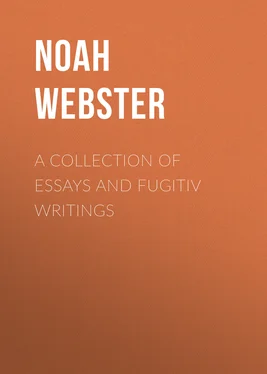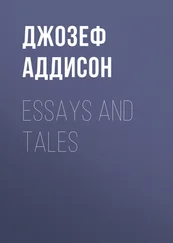Noah Webster - A Collection of Essays and Fugitiv Writings
Здесь есть возможность читать онлайн «Noah Webster - A Collection of Essays and Fugitiv Writings» — ознакомительный отрывок электронной книги совершенно бесплатно, а после прочтения отрывка купить полную версию. В некоторых случаях можно слушать аудио, скачать через торрент в формате fb2 и присутствует краткое содержание. Жанр: foreign_prose, foreign_antique, на английском языке. Описание произведения, (предисловие) а так же отзывы посетителей доступны на портале библиотеки ЛибКат.
- Название:A Collection of Essays and Fugitiv Writings
- Автор:
- Жанр:
- Год:неизвестен
- ISBN:нет данных
- Рейтинг книги:5 / 5. Голосов: 1
-
Избранное:Добавить в избранное
- Отзывы:
-
Ваша оценка:
- 100
- 1
- 2
- 3
- 4
- 5
A Collection of Essays and Fugitiv Writings: краткое содержание, описание и аннотация
Предлагаем к чтению аннотацию, описание, краткое содержание или предисловие (зависит от того, что написал сам автор книги «A Collection of Essays and Fugitiv Writings»). Если вы не нашли необходимую информацию о книге — напишите в комментариях, мы постараемся отыскать её.
A Collection of Essays and Fugitiv Writings — читать онлайн ознакомительный отрывок
Ниже представлен текст книги, разбитый по страницам. Система сохранения места последней прочитанной страницы, позволяет с удобством читать онлайн бесплатно книгу «A Collection of Essays and Fugitiv Writings», без необходимости каждый раз заново искать на чём Вы остановились. Поставьте закладку, и сможете в любой момент перейти на страницу, на которой закончили чтение.
Интервал:
Закладка:
Representativs are chosen by the inhabitants of certain districts, because this is most convenient: But when they act as lawgivers, they act for the whole state. When a man is considering the propriety of a general measure, he is not to be influenced by the interest of a single district or part of a state; but by the collectiv interest of the whole state. A good lawgiver will not ask solely what is my interest, or the interest of my town or constituents? but, what will promote the interest of the community; ' what will produce the greatest possible good, to the greatest number of people ?'
When a legislativ body makes laws , it acts for itself only, and can alter or repeal the laws when they become inconvenient. But when it makes grants or contracts , it act as a party, and cannot take back its grant, or change the nature of its contracts, without the consent of the other party. A state has no more right to neglect or refuse to fulfil its engagements, than an individual. There may be an exception in the case of a grant, for if a state has made a grant, which, contrary to its expectations, clearly endangers the safety of the community, it may resume that grant. The public safety is a consideration superior to all others. But the danger must be great and obvious; it must be generally seen and felt, before the state can be justified in recalling its grant. To take back a gift, or break a contract, for small causes or slight inconveniencies, is a most wanton abuse of power. Bargains, conveyances, and voluntary grants, where two parties are concerned, are sacred things ; they are the supports of social confidence and security; they ought not to be sported with, because one party is stronger than the other; they should be religiously observed.
As the state has no right to break its own promises, so it has no right to alter the promises of individuals. When one man has engaged to pay his debt in wheat, and his creditor expects the promise to be fulfiled, the legislature has no right to say, the debt shall be paid in flax or horses. Such an act saps all the supports of good faith between man and man; it is the worst kind of tyranny.
For this reason, all tender laws , which oblige a creditor to take, for his debt, some article which he never intended nor engaged to take, are highly unjust and tyrannical . The intention of the contracting parties should be strictly regarded; the state may enforce that intention, but can never have a right to interfere and defeat it. A legislature has no right to put a bargain on any footing, but that on which the parties have placed it or are willing to place it.
If a state is poor, and people owe more money than can be procured, a legislature may perhaps go so far as to suspend the collection of debts; or to ordain that a certain part only of the debts shall be recoverable immediately, and the payment of the remainder suspended. This may ease the debtors; but can be justified in extreme cases only, when the people are generally and greatly involved.
A people should not generally be in debt: The consumers of goods should not get credit. Heavy and numerous debts are great evils to a state. If the people will giv and take extensiv credit, the state should check their imprudence, by putting debts out of the protection of law. When it becomes a practice to collect debts by law, it is a proof of corruption and degeneracy among the people. Laws and courts are necessary to settle controverted points between man and man; but a man should pay an acknowledged debt, not because there is a law to oblige him, but because it is just and honest , and because he has PROMISED to pay it.
Money, or a medium in trade, is necessary in all great states; but too much is a greater evil than too little . When people can get money without labor, they neglect business and become idle, prodigal and vicious; and when they have nothing but money, they are poor indeed. Spain was ruined by its mines of gold and silver in South America. That kingdom possessed all the money in Europe, and yet was the poorest ; it will never be rich and flourishing, till its mines are exhausted. The discovery of rich mines in this country, would be the greatest misfortune, that can befall the United States.
Money is a mere representativ of property; it is the change which facilitates trade. But the wealth of a country is its produce ; and its strength consists in the number of its industrious inhabitants. A man cannot become rich, unless he earns more than he spends. It is the same with a country. The labouring men are the support of a nation.
The value of money depends on the quantity in circulation. A medium of trade respects all commercial nations; and like water, it will find its level. Money will go where it is wanted, if the people have any thing to purchase it. If one state or country has more money than another, it is a proof that the people are more industrious or saving. It would be happy for the world, if no more money could be made: There is already too much. Silver is become very burdensome, merely because there is too much in the world. If there were but one quarter of the money which now circulates, one quarter of a dollar would buy as much as a dollar will now.
Hence the mistaken policy of those people who attempt to increase the medium of trade by coinage or by a paper currency. They can add to the quantity, as much as they please; but not to the value. If America were shut out from all intercourse with other nations, and ten millions of dollars were circulating in the country, every article of life would have a certain price. If in this case, wheat should be one dollar a bushel, let the money be instantly doubled, the price of wheat would then be two dollars, and the price of every article would rise in the same proportion. So that twenty millions of dollars would be worth no more than ten, because they would buy no more of the useful commodities: America would be no richer in the one case than in the other.
But as there is a communication with other nations, a million of dollars, added to the circulating specie, does not increase the permanent medium in quantity; for just so much money as is added, will leave the country. If there is too much money in a country, the price of labor will rise, and the produce cannot find market abroad without a loss. This was the case with American produce, at the close of the war. If money is scarce in a country, the price of labor will be low, and consequently the produce of that country will be cheap at home, and a great profit will be made on the exportation. This profit will be returned, partly in goods and partly in money, and the country is enriched.
But the great principle, which should constitute the corner stone of government, is public justice . The fountain head should be pure, or the streams will be foul indeed. That Legislatures, or bodies politic, should make laws, annex penalties for disobedience, institute courts for deciding controversies and trying offenders, and execute punishments on those that are convicted; yet at the same time neglect to do justice themselves by paying their own debts; this is of all absurdities the most glaring. To compel individuals to perform contracts and yet break their own solemn promises; to punish individuals for neglect, and yet set a general example of delinquency, is to undermine the foundation of social confidence, and shake every principle of commutativ justice.
These are general principles in government and trade, and ought to be deeply impressed upon the minds of every American.
No. III
NEW YORK, 1788.
One of the principal objections to the new Federal Constitution, is, that it contains no Bill of Rights . This objection, I presume to assert, is founded on ideas of government that are totally false. Men seem determined to adhere to old prejudices, and reason wrong , because our ancestors reasoned right . A Bill of Rights against the encroachments of Kings and Barons, or against any power independent of the people, is perfectly intelligible; but a Bill of Rights against the encroachments of an electiv Legislature, that is, against our own encroachments on ourselves , is a curiosity in government.
Читать дальшеИнтервал:
Закладка:
Похожие книги на «A Collection of Essays and Fugitiv Writings»
Представляем Вашему вниманию похожие книги на «A Collection of Essays and Fugitiv Writings» списком для выбора. Мы отобрали схожую по названию и смыслу литературу в надежде предоставить читателям больше вариантов отыскать новые, интересные, ещё непрочитанные произведения.
Обсуждение, отзывы о книге «A Collection of Essays and Fugitiv Writings» и просто собственные мнения читателей. Оставьте ваши комментарии, напишите, что Вы думаете о произведении, его смысле или главных героях. Укажите что конкретно понравилось, а что нет, и почему Вы так считаете.












